This could be an election like no other in Northern Ireland.
The campaign will officially get under way at midnight, when the Stormont Assembly is dissolved.
There is a possibility that the vote on 5 May could result in a truly historic and seismic shift in the political landscape.
Sinn Féin could potentially emerge as the largest party north of the border.
That would mean Michelle O'Neill would be First Minister, if devolution is restored. A republican would lead what former Northern Ireland prime minister James Craig famously described as "a Protestant parliament and Protestant state".
It would also mean Jeffrey Donaldson would be under immense pressure as DUP leader less than a year after taking the job as he would become the first leader of unionism not to maintain its electoral supremacy.
A series of opinion polls in recent months suggest that scenario could unfold, but it is far from certain as Sinn Féin seats are vulnerable in a number of constituencies.
The last Stormont elections in 2017 saw the DUP return with 28 Members of the Legislative Assembly (MLAs), just one ahead of Sinn Féin with 27. In recent months one of the DUP members, Alex Easton, left the party and declared himself as an Independent, so the parties are currently tied.
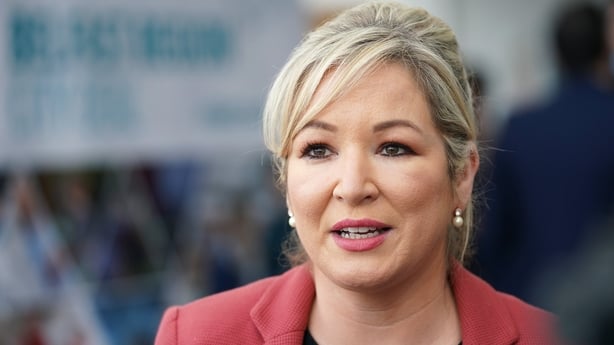
The DUP has been in turmoil for the past year with two leaders since Arlene Foster was unceremoniously ousted in a coup led by a group loyal to Edwin Poots, who himself was forced to resign after just 21 days in the job, with Jeffrey Donaldson taking over the reins.
Sinn Féin is fielding 34 candidates across the 18 constituencies in a bid to maximise its first preference vote, and subsequent transfers. The party senses political blood, but for its ambitions to be realised, everything has to go its way.
"Sinn Féin did so well in 2017, the election literally couldn’t have went better for them, there’s nowhere else they could have potentially gained, but the problem is they have to hold that now," explains David McCann, political commentator and deputy editor of the Slugger O’Toole website.
"They hold some of those seats by very narrow margins. You take a look at somewhere like their second seat in North Belfast, you take a look at their third in Fermanagh and South Tyrone, their third in West Tyrone, those are held by not huge margins and could potentially fall if they get a swing away from them which the polls are showing they will."
Foyle, which includes the city of Derry, is also potentially a huge problem for the party. It holds two of the five seats there, but its two candidates elected last time, Martina Anderson and Karen Mullan, were both removed last year after a bitter internal revolt and replaced with relative unknowns.
Add to that the fact that SDLP leader Colum Eastwood wrestled the Westminster seat back from Sinn Féin in the 2019 British General election with a majority of more than 17,000.
To have any chance of finishing as top party, Sinn Féin needs to retain both of the seats, but the SDLP will pull out all the stops in an effort to retain the huge vote in the Westminster poll and to take at least one of them.
Serious political firepower will be deployed by both sides in what is a key battle ground in the contest within nationalism, as well as the one between Sinn Féin and the DUP.
The SDLP has a partnership arrangement with Fianna Fail and Taoiseach Micheál Martin is expected to visit Derry this week to support its campaign. Sinn Féin president Mary Lou McDonald is also expected to visit in the early days of the campaign.
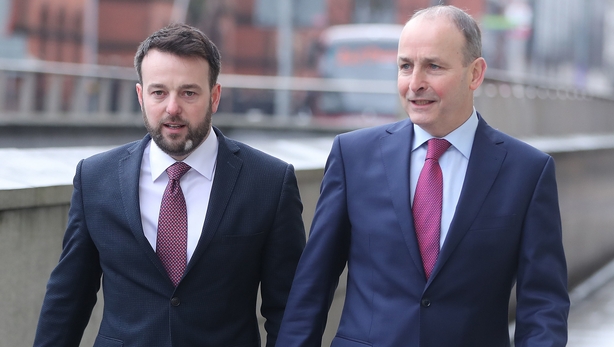
There is also potential jeopardy in the Sinn Féin stronghold of west Belfast, where it holds 4 of the 5 seats, with the other held by Gerry Carroll of People Before Profit. There have been calls for the DUP, Ulster Unionists and Traditional Unionist Voice not to co-contest the constituency but to back an agreed unionist community candidate. Should that happen, one of the Sinn Féin seats could fall.
Increased expectations within the party could spell potential danger for Michelle O’Neill. Failing to emerge as the top party will be viewed by many as a missed historic opportunity. A fall in its percentage vote and its number of MLAs could lead to questions about her leadership and the party’s direction.
For Sinn Féin, this election is about much more than Stormont.
The party’s performance will be watched closely by Fianna Fail, Fine Gael and the Greens as Mary Lou McDonald targets being in government in the Republic, and potentially occupying the office of Taoiseach next time around.
A strong performance and its emergence as largest party north of the border would embolden Sinn Féin, strengthen its calls for a Border Poll and its narrative that it is the largest party on the island.
A drop in its vote and the failure to secure a historic victory would undoubtedly be a major setback that would be seized upon by opponents south of the border.
But the DUP is also under intense pressure. For the first time in the history of Northern Ireland, the possibility that a nationalist might be the de facto prime minister is no longer the stuff of political fantasy, it is being discussed and debated on a daily basis.
Jeffrey Donaldson will attempt to use that to his advantage, a "scare the horses" tactic to motivate unionists to back him and his party as the only realistic way to stop what they would view as a nightmare scenario.
He’s helped by the fact that while virtually everything went well for Sinn Féin in 2017, the DUP fared relatively badly. It only holds 3 seats in one constituency, Strangford, and believes it has sufficient buffers to hold on to its others even if its vote is down by a few percentage points.
The party is fielding 30 candidates, down from 38 in 2017, but it says the number was inflated by the fact that at the time the Assembly was reduced from 108 seats to 90 and many of its candidates were sitting MLAs who had the right to seek re-election to the smaller legislature.
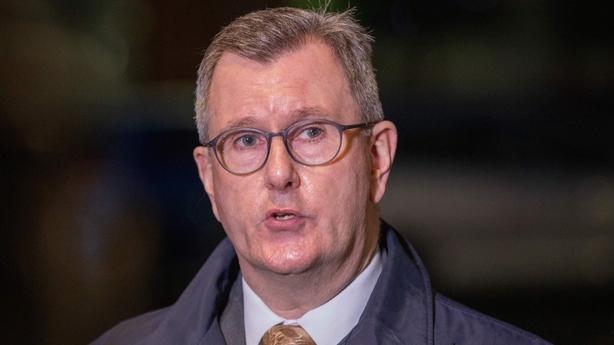
Jeffrey Donaldson has said repeatedly since becoming leader that removing the Northern Ireland Protocol is his priority, but while there is no doubt it matters a great deal to many unionists; opinion polls and internal polling indicate that the health service and the soaring cost of living are identified as the key issues of main concern for the majority of voters.
The party’s stance is complicated by the fact that many within unionism and loyalism blame the DUP for the Protocol, as the party backed Boris Johnson in delivering Brexit, the father of the Protocol, which critics say creates a border between Northern Ireland and Britain, and therefore weakens its constitutional position.
Senior party figures were alarmed and dismayed in equal measure when Sammy Wilson, the MP for East Antrim and one of the DUP’s most outspoken critics of the Protocol, was booed and branded a "traitor" at an anti-Protocol rally in the Co Armagh village of Markethill last month.
The party fears that unionists, including many of its own supporters, who are motivated mainly by opposition to the Protocol will back the Traditional Unionist Voice, led by Jim Allister.
Making the 5 May poll a de facto referendum on the Protocol could spectacularly backfire.
"There definitely is a section of unionism that is very angry about the protocol, we say that in Markethill," says political commentator Sarah Creighton.
"That anger and resentment is real and very, very raw, and I think that will motivate them and get them to the polls. It’s not clear yet which party will benefit from that."
The DUP knows that many unionists opposed to the Protocol did not support Jeffrey Donaldson’s decision to withdraw from the Stormont Executive and see the health service and rising cost of living as more important issues.
"I think they have got it wrong, I think making this a single-issue election is not going to work out very well for them because of those nuances within the unionist community and the fact that those other issues are important to people across Northern Ireland," Sarah Creighton adds.
"I think they have backed themselves into a corner here, you know. For that section of the electorate that’s very angry about the Protocol, if they can’t deliver on that then they’ve no space to move basically. For some people nothing less than the full removal of the Protocol is acceptable basically and they’ve given themselves no room for manoeuvre."
Former British Army officer Doug Beattie also hopes to pose a threat to the DUP as the Ulster Unionist leader seeks to reverse the trend of recent elections which witnessed the decline of the UUP as the traditional dominant force within unionism.
But while the so-called 'Beattie Bounce’ saw him make initial gains in opinion polls, he has a huge amount of ground to make up as his party goes into this election with just ten seats, and one of those is viewed as highly vulnerable.
"The problem is they did so badly the last time. If they are to gain seats, they need a big swing to them," says David McCann.
"And the polls at the minute are showing them on around 14%, but that’s only one point up on where they were in 2017."
SDLP leader Colum Eastwood bristles at any suggestion that his party is in terminal decline and that Sinn Féin’s continued success is a foregone conclusion. He points to his election, and that of Claire Hanna in south Belfast in the 2019 British General Election as evidence that a resurgence is possible.
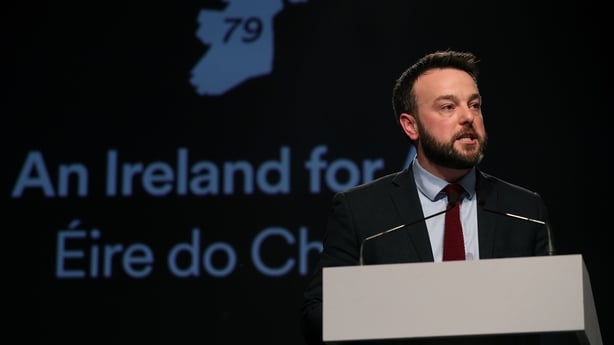
The party currently has 12 MLAs, 5 ahead of the centre ground Alliance Party which is confident of making gains.
As well as its traditional battle with Sinn Féin for nationalist votes, an added problem this time around is that polls indicate that Alliance is now drawing support from nationalist parties as well as from unionism, with its leader Naomi Long attracting cross-community support.
"Half of the Alliance’s targets in this election are coming at the expense of the SDLP and Sinn Féin and that is new," explains David McCann.
"Up until fairly recently, Alliance fished predominantly in a unionist pool, they took votes away from the Ulster Unionist Party predominantly, now they’re starting to take votes in places like South Down and North Belfast and those are coming at the expense of the nationalist parties, not the unionist parties."
Alliance is currently on 7 seats but is widely expected to add to that number: the big question is which party will it damage most?
Recent opinion polls also show a growth in support for the Greens, which is tipped to retain its two seats while possibly increasing its vote. Any such increase will be at the expense of other parties and could potentially make the difference in tight contests, of which there are likely to be many.
Whatever the outcome of the election, there is a sense that a return to power-sharing could be some way off.
Jeffrey Donaldson has stated that his party will not go back into the Stormont Executive until the Northern Ireland Protocol is resolved to its satisfaction, and at this stage that doesn’t appear to be on the horizon.
The problem could become more complicated if Sinn Féin is the largest party. While Michelle O’Neill has made clear that her party will nominate a First or Deputy First Minister, whichever the case may be, Jeffrey Donaldson has repeatedly ducked the question.
That’s because a commitment that he would be willing to act as Deputy First Minister in an administration with Sinn Féin as the largest party would be seized upon by his opponents within unionism, and indeed within his own party, as an admission of potential defeat. Many within the DUP have made it very clear they would struggle to play second fiddle.
Such an outcome would be a real test of the credentials of the Democratic Unionist Party.
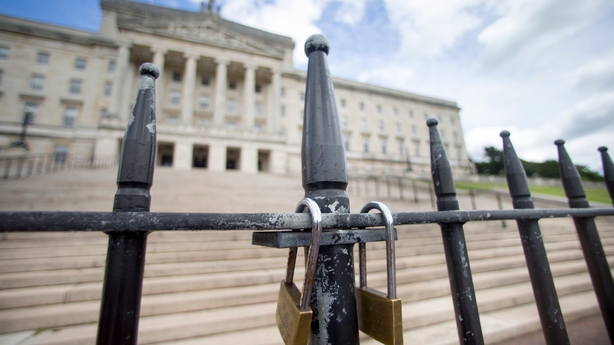
"I think it would be strategically stupid for the DUP not to nominate because if they do that they risk people’s faith in devolution, they risk people’s faith in Northern Ireland and they risk damaging the wider cause of unionism," says Sarah Creighton.
She shares the view that many unionists would struggle to accept a government led by Sinn Féin, even though the position of First and Deputy First Ministers is a joint office, with both having to sign off on Executive decisions.
"It’s the symbolism of that, the fact that unionism isn’t on top, that sense of supremacy that I think some unionists, and I can’t stress enough ‘some’ unionists, I think still cling to."
A change to the way the Stormont Executive functions means an immediate crisis will be avoided if there is a failure to reach agreement on a return to power-sharing.
Under the former rules there was a 7-day period for the parties to nominate a First and Deputy First Minister after an election. If that did not happen, another election would be scheduled.
Under the new rules, the parties have up to 24 weeks to reach agreement. During that time the ministers from the outgoing Assembly would remain in post in a caretaker capacity, so while no new policies could be agreed or implemented, their departments could continue to function. If one of the office holders was to step down or fail to secure election, the position would be filled by someone else from within their party.
A physical move by the Northern Ireland Office last month has been interpreted as a signal that it doesn’t expect much political movement after the election.
The UK government department has moved out of the Stormont estate and into new, larger offices in Belfast City Centre, where officials from a number of Whitehall departments are being deployed.
"They seem to be preparing for a potential period of direct rule," says one former senior political adviser.
"It seems clear that they’re preparing for the worst-case scenario."
Even before a vote has been cast, dark clouds are looming over the next Stormont Assembly.
Then again, they’ve never really been that far away.







